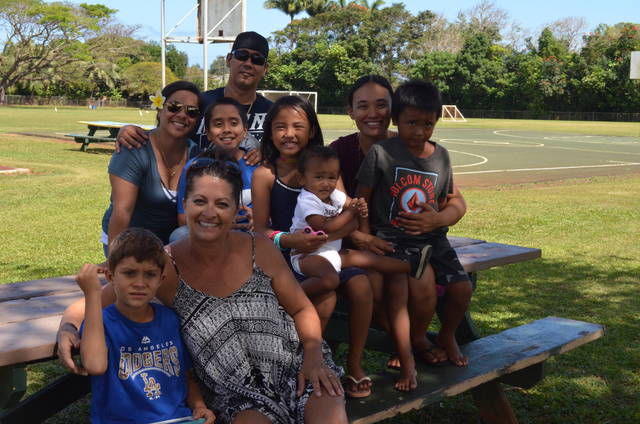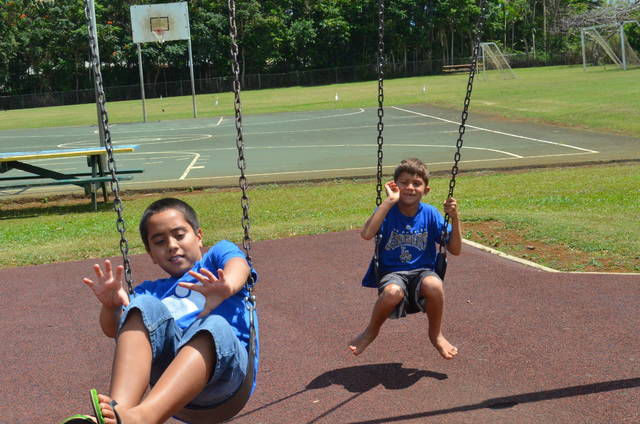KAPAA — Makana Keener and Koni Adric sat under the jungle gym at Kapahi Park on Wednesday, sharing Oreo cookies in the shade. “They’re in their own world over there,” Cynthia Keener said. “Look at them laughing.” She was sitting
KAPAA — Makana Keener and Koni Adric sat under the jungle gym at Kapahi Park on Wednesday, sharing Oreo cookies in the shade.
“They’re in their own world over there,” Cynthia Keener said. “Look at them laughing.”
She was sitting at a bench with Pi’ilani Farias, Alika Adric and Chelsey Contrades, discussing one of the things all of them have in common: parenting a child on the autism spectrum.
Keener said her son Makana, who is 8, was born healthy, but started having seizures when he was 1.
“All hell broke loose after he was immunized,” she said. “It was so scary and disheartening.”
He’s high-functioning, but doesn’t know his boundaries and can become fixated on things, she said.
Contrades’ 5-year-old son, La’akea, is quiet and can disappear on a whim.
“That’s my greatest fear when I leave him with a sitter,” she said. “That he’ll disappear. He’s nonverbal. He has the words, but he won’t tell you where he’s going. He just goes.”
Farias’ and Adric’s 9-year-old son Koni was born premature and they said they were advised he might be on the spectrum.
“But when he was diagnosed, I didn’t even know it was a spectrum, I thought you were just either autistic or you weren’t,” Farias said. “The whole thing is a learning experience and you have to learn patience.”
It’s a common process for more and more parents in the United States. Autism occurrences have risen from a rate of 1 in 150 in the year 2000 to 1 in 68, according to the Center for Disease Control.
“That’s a huge population,” said Jackie Baker-Belding, a board-certified behavior analyst with Aptitude Habilitation Services. “I work with the parents, train them on best practices and support them.”
Behavior analysts work with families, schools and other caregivers to get everyone on the same page with the individual, Baker-Belding said.
Some health insurance plans now cover treatment for autism spectrum disorders thanks to Luke’s Law, which was signed into law in 2015.
“That’s opened the door for services,” Baker-Belding said. “We’re still in the infancy stages of letting families know about this and have them access services, and I’m one of the many providers on the island.”
Behavior analyst Michelle Wong, also with Aptitude Habilitation Services, said she’s thrilled more people have access to services because she sees the way the support can change lives.
“It can really make a difference,” she said. “But we work with some of the most amazing people; they’re truly incredible.”
And while changing lives is part the of the plan, changing the essence of the individual isn’t, Baker-Belding said.
“People with autism are a gift to our world and we don’t want to change them. We want to help them be independent,” she said.
Working with behavior analysts like Wong and Baker-Belding has been a lifesaver for parents with children on the spectrum, according to the group at Kapahi Park on Wednesday.
Gathering with others who have children who are on the spectrum is also important to help with feeling connected and surrounded by community.
“Getting together like this is therapeutic for all of us,” Farias said. “It’s great for the kids, but wow, it’s so good for us parents.”
Info: Kauai Autism Taskforce, 346-5365



